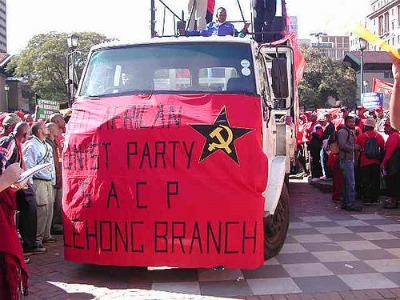
The following is a 90th birthday greeting sent to the South African Communist Party from the Communist Party USA.
The history of the world communist movement has been one of triumphs and defeats, and of struggle under all sorts of conditions of repression and other difficulties.
Few of the world’s workers and communist parties have managed to come through so many years of forced underground work and then emerged into as a powerful position of legal political participation as has the South African Communist Party (SACP), currently celebrating its 90th birthday.
Born in 1921, as the Communist Party of South Africa, into a complex and difficult situation of class and national struggle, the SACP, at the very outset, had to develop an understanding of how to fight against capitalist exploiters and racist colonial oppressors at the same time.
Originating with mostly white workers and intellectuals, the SACP’s leadership immediately saw the need to turn itself into the key instrument of struggle on all fronts for the Black workers who constituted the overwhelming majority of the South African working class, and of the country.
In this transformation, which included becoming, in a very few years, an overwhelmingly Black organization, it was completely successful. While never being a “racial” organization, the SACP produced a series of brilliant and courageous Black leaders such as Secretaries General Moses Kotane, Moses Mabhida, Chris Hani and the SACP’s current secretary general, Blade Nzimande, as well as outstanding figures from other races, including Brian Bunting, Ruth First, Joe Slovo, Yusuf Dadoo, Ahmed Kathrada and many others.
The SACP played an important role in the mobilizing of South Africa against fascism in the World War II, in a context in which important white politicians were for neutrality or even tilted toward the Axis.
Once the war was ended, the SACP helped to mobilize against the fascist trends that had developed in sectors of the white population such as the Broederbond, Purified National Party and the Ossewa Brandwag (Ox Wagon Sentinels).
Future leaders such as Joe Slovo worked to bring demobilized South African soldiers into a counter-organization, the Torch Commando, which mobilized against these racist and fascist elements, while at the same time broadening the SACP’s base among the Black working-class majority and within the labor union movement.
After the war, the SACP participated with honor in an upsurge of the mostly Black working class, playing an important role in the African Mine Workers’ strike and general strike in 1946.
In this period also, the SACP was involved with the creation of the Freedom Charter, a document that continues to guide democratic movements around the world today.
When the reactionary Nationalist Party came to power in the 1948 elections, it considered the SACP to be a particular thorn in its side, and the party was banned in 1950 and persecuted under the Suppression of Communism Act.
It reorganized itself underground under its present name, and never flagged in the struggle even when leading SACP figures such as Ruth First were brutally assassinated by the apartheid regime.
In spite of banning and repression, the SACP continued to help build the African National Congress and its allies in the Congress of Democrats as the main mass forces for the fight for nonracial democracy. It provided many brave fighters for the ANC armed wing, Umkhonto we Sizwe (Spear of the Nation), some of whom met martyrdom in the struggle.
The SACP was unbanned along with the ANC and the Congress of South African Trade Unions, COSATU, at the point that the apartheid regime found it could no longer hold onto power.
In the historic 1994 elections, the Tripartite Alliance of the ANC, SACP and COSATU swept into power with the overwhelming support of the Black majority in South Africa, and continues to govern today.
With its Young Communist League and with its fine publications, including Umsebenzi and the African Communist, the SACP continues to break new ground. It is showing the way how to promote working-class interests within a united front alliance, while also contributing greatly to the anti-imperialist struggle, especially in Africa, where the SACP is inspiring new left-wing formations in a number of countries.
We, in the Communist Party of the USA, have learned much and continue to be inspired by you and to learn even more from the experiences of the SACP.
Comrades, we salute you on the occasion of your 90th anniversary, and wish you many more triumphant years!
Emile Schepers is international secretary for CPUSA.
Photo: The SACP provides a speakers’ stage during a 2005 rally before the COSATU general strike. (Naphiri/CC)


 Join Now
Join Now